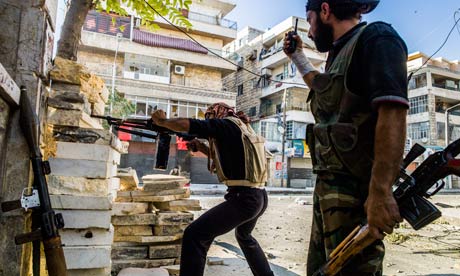Guardian: Foreign Fighters Join Rebels, Admit Defeat

Local Editor
More details of foreign rebels flooding into Syria are revealed. This time, the famous British daily Guardian reported some of the scenes from the ground field.

According to the daily, one of the fighters named as Abu Omar al-Chechen had a ragtag band of foreign fighters, known as "muhajiroun brothers". He was huddled in the doorway of a burned-out apartment building in the university district of Aleppo.
One of the so-called "brothers" - a Turk - lay dead in the road around the corner and a second brother lay next to him, badly wounded and unable to move.
Abu Omar gave an order in Arabic, which was translated into a babble of different languages - Chechen, Tajik, Turkish, French, Saudi dialect, Urdu.
Their Syrian rebel handler stood alone in the street clutching two radios: one blared in Chechen and the other in Arabic.
Among the fighters was a thin Saudi, dressed in a dirty black T-shirt and a prayer cap, who conversed in perfect English with a Turk sitting next to him. He had arrived the week before and was curious about how the so-called "jihad" was being reported abroad.
"What do the foreign news organizations and the outside world say about us?" he asked. "Do they know about the fighting in Aleppo? Do they know that we are here?"
The daily further mentioned that "hundreds of international fighters have flocked to Syria to join the war."
"Some are fresh-faced idealists driven by a romantic notion of revolution....Others are al-Qaida veterans of Iraq, Yemen and Afghanistan," it added.
To reach the wars in those countries, foreign fighters had to cross borders with forged passports and dodge secret services.
The frontline in Syria is easier to reach via a comfortable flight to southern Turkey and a hike across the border.
According to the Saudi, it was an easy walk from Turkey to the small Syrian town of Atmeh. There, the foreign fighters were received by a Syrian who runs an extremist camp and organized into fighting units.
Each team was assigned an Arabic speaker and given 10 days' basic training, the point of which was not to learn how to shoot but to learn to communicate and work together.
The fighters were then dispersed among the different extremist organizations, including Ahrar al-Sham [the Free Men of Syria] and Jabhat al-Nusra [the Front for the Aid of the People of the Levant]. Some, like Abu Omar's Chechens, were allowed to form their own units and simply referred to as the muhajiroun, or "immigrants".
The extremists refer to the internationals collectively as the "Turkish brothers".
The disparate levels of fighting ability among the men was immediately clear. The Chechens were older, taller, stronger and wore hiking boots and combat trousers. They carried their weapons with confidence and distanced themselves from the rest, moving around in a tight-knit unit-within-a-unit. One of the Turks was a former soldier who wore western-style webbing and equipment, while the three Tajiks and the Pakistani were evidently poor.
The men were also secretive, especially when dealing with the Free Syria Army. When the Syrians asked them where they were from, a blond French-speaker said they were Moroccans, the Chechens said they were Turks and the Tajiks said they were Afghans. On the steps of a commandeered school, behind a flimsy barricade of corrugated sheets and a barrel, a group of Libyans sat complaining about the lack of ammunition.
Inside the school was a Jordanian who often roamed the frontline with his Belgian gun, for which he had only 11 bullets.
Some of the foreign fighters such as Abu Salam al Faluji boasted extraordinary experience. Abu Salam, a rugged Iraqi with a black keffiyeh wrapped around his head, said he had fought the Americans in Falluja when he was a young man. Later he joined al-Qaida in Iraq and spent many years fighting in different cities before moving to Syria to evade arrest. These days he was a commander of the one of the "muhajiroun" units.
"It is obvious the Syrian army is winning this battle, but we don't tell [the rebels] this. We don't want to destroy their morale," he confessed.
Two Chechens were already in the middle of the square. They hid behind a short stone wall while bullets chipped on the wall's edge.
There had been 40 "muhajiroun" few days earlier but by the end of fighting that day they were down to 30. They had lost 10 men in two days.
At the border post of Bab al Hawa some days later, a confrontation was brewing between the jihadis and Syrian rebels.
Fighters from the Farouq brigade - one of the best-equipped and most disciplined units in the FSA -wore military uniforms and green T-shirts emblazoned with insignia of the brigade.
Nearby, a group of 20 extremists had gathered in a circle around a burly Egyptian with a chest-long silver beard.
"You are in confrontation with two apostate armies," the Egyptian told the men, referring to the Syrian army and Free Syrian Army. "When you have finished with one army you will start with the next."
The confrontation had started a few weeks ago, when the foreign fighters, raised the black flag of al-Qaida.
Source: Guardian, Edited by moqawama.org




